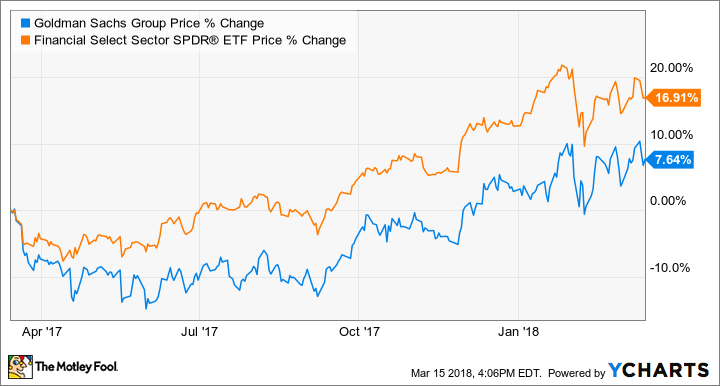Best Low-P/E Stocks to Buy in March
The stock market has retreated from its record highs, but it can still be tough to find reasonably valued stocks, given the average P/E ratio of the S&P 500 is currently around 25. For context, the historical average S&P 500 P/E is just 15.7.
However, there are still some cheap stocks in the market that are worth buying. Here are three in particular that could be worth a look in March.

If you have some extra cash to invest, here are three stocks to put on your radar. Image source: Getty Images.
Company | Recent Stock Price | Dividend Yield | P/E Ratio (TTM) |
|---|---|---|---|
Aflac (NYSE: AFL) | $88.64 | 2.4% | 12.0 |
Goldman Sachs (NYSE: GS) | $260.91 | 1.2% | 12.9 |
HCP, Inc. (NYSE: HCP) | $22.28 | 6.8% | 11.4* |
Data source: TD Ameritrade. *For HCP, funds from operations is used in place of earnings in the P/E ratio, as it is more indicative of a REIT's income. Prices and yields as of March 5, 2018.
A geographically diverse insurer
Most Americans know Aflac as a workplace voluntary insurance provider and for its duck commercials, but many don't realize that the bulk of Aflac's revenue actually comes from Japan. Aflac is the leading medical and cancer insurance provider in Japan, with 1 in 4 Japanese households insured by the company.
Aflac's stock price took a recent hit following a report about alleged fraud and mistreatment of sales associates, which the company immediately denied. Most of the lost ground was made up, however, and Aflac subsequently reported better-than-expected revenue and earnings for the fourth quarter.
Going forward, Aflac expects steady 2%-3% annual premium growth, and the recent 16% dividend increase goes to show its confidence in this growth and its financial strength, as does the company's generous buyback program.
Additionally, there are two catalysts that could give the company's bottom line a big boost. Rising interest rates could certainly help, as the primary way insurers make their money is through investment income -- mainly in bonds -- which haven't paid too much in recent years. U.S. tax reform could also be a powerful tailwind. Not only did Aflac record a $1.7 billion benefit from tax reform on its most recent earnings, but the company also plans to increase its U.S. investment and expansion significantly over the next three to five years.
As a final note on Alfac, it's worth noting that the stock is splitting two-for-one as of March 16, 2018. So, if you're looking at Aflac's price after that date and it seems incredibly low, that's why.
When trading revenue rebounds, this stock could soar
Investment banking giant Goldman Sachs has underperformed the financial sector by a significant margin over the past year.
To be clear, there's good reason for it. Trading revenue (which Goldman should be very good at generating) plunged by 50% over the past year. Sure, trading revenue is down industrywide thanks to low volatility, but Goldman's drop is more dramatic than its peers'.
However, most of Goldman's business is doing quite well. Goldman's earnings and revenue have come in above expectations, 2017 was the second-best year ever for Goldman's investment banking revenue, and its Marcus consumer banking platform has grown faster than most people expected. Plus, the passage of tax reform could provide a big boost to Goldman's bottom line going forward.
With the recent surge in stock market volatility, trading revenue could be set for a big rebound. If it does, Goldman's revenue, and its stock price, could soar.
A rock-solid REIT in a growing industry
Real estate investment trusts have been underperforming over the past year or so, mainly because of rising interest rates. Healthcare REITs, especially those specializing in senior housing, have done worse than most thanks to oversupply fears.
So now could be a smart time to pick up a solid healthcare REIT like HCP at a discount. The stock now trades for just 11.4 times funds from operations (FFO), and yields almost 7%, despite a strong asset portfolio and much-improved balance sheet.
HCP has been a public company for 32 years, but has undergone a significant transformation over the past couple of years. The company spun off its riskiest assets, reduced its exposure to its largest tenant, and make several other moves intended to add long-term stability and maximize responsible growth potential. Ninety-five percent of the portfolio's rental income comes from stable, private-pay revenue sources, and HCP has reduced its debt-to-EBITDA ratio significantly since mid-2016.
Now, HCP owns 828 properties, most of which are of three core property types -- senior housing, medical office, and life science, all of which have significant growth potential in the years ahead thanks to the aging U.S. population.
As a final point, not only will the need for medical facilities grow over the coming decades, but there is tremendous potential for consolidation among the existing inventory of healthcare properties. The U.S. healthcare real estate market is $1.1 trillion in size, and no REIT has more than a 3% market share. Only about 15% of all healthcare properties are REIT-owned, and medical offices in particular have lots of room for consolidation.
More From The Motley Fool
Matthew Frankel owns shares of HCP. The Motley Fool recommends Aflac. The Motley Fool has a disclosure policy.

 Yahoo Finance
Yahoo Finance 
